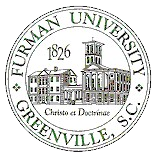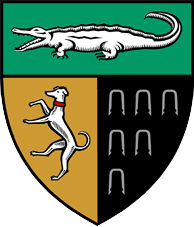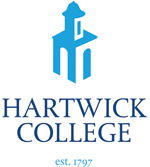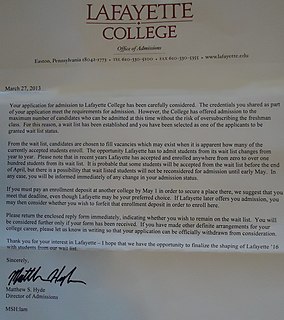
Furman University is a private liberal arts university in Greenville, South Carolina. Founded in 1826 and named for the clergyman Richard Furman, Furman University is the oldest private institution of higher learning in South Carolina. It became a secular university in 1992, while keeping Christo et Doctrinae as its motto. It enrolls approximately 2,700 undergraduate students and 200 graduate students, representing 46 states and 53 foreign countries, on its 750-acre (304 ha) campus.

The Universities and Colleges Admissions Service is a UK-based organisation whose main role is to operate the application process for British universities. It operates as an independent charity, funded by fees charged to applicants and to universities, plus advertising income, and was formed in 1992 through the merger of the former university admissions system UCCA and the former polytechnics admissions system PCAS.

Yale Law School is the law school of Yale University, located in New Haven, Connecticut, United States. Established in 1824, Yale Law offers the J.D., LL.M., J.S.D., M.S.L., and Ph.D. degrees in law.

Hartwick College is a private college in Oneonta, New York. The institution's origin is rooted in the founding of Hartwick Seminary in 1797 through the will of John Christopher Hartwick. In 1927, Hartwick Seminary moved to expand into a four-year college and was offered land by the city of Oneonta to move to Hartwick College's current location. The school has 1,200 undergraduate students from 30 states and 22 countries, 187 faculty members and the student-faculty ratio is 11-1.

The Princeton Review is a college admission services company offering test preparation services, tutoring and admissions resources, online courses, and books published by Random House. The company has more than 4,000 teachers and tutors in the United States and Canada and international franchises in 14 other countries. The company is headquartered in New York City, and is privately held. Despite the title, it is not associated with Princeton University.
Early decision (ED) or early acceptance is a common policy used in college admissions in the United States for admitting freshmen to undergraduate programs. It is used to indicate to the university or college that the candidate considers that institution to be his or her top choice.
University admission or college admission is the process through which students enter tertiary education at universities and colleges. Systems vary widely from country to country, and sometimes from institution to institution.

The Yale School of Management is the graduate business school of Yale University in New Haven, Connecticut. The School awards the Master of Business Administration (MBA), MBA for Executives (EMBA), Master of Advanced Management (MAM), Master's Degree in Systemic Risk, Master's Degree in Global Business & Society, Master's Degree in Asset Management, and Ph.D. degrees, as well as joint degrees with nine other graduate programs at Yale University. As of August 2019, 666 students were enrolled in its MBA program, 134 in the EMBA program, 70 in the MAM program, 32 in the Master of Global Business Studies program, 11 in the Master of Systemic Risk program, and 59 in the PhD program; 122 students were pursuing joint degrees. The School has 90 full-time faculty members, and the dean is Kerwin Kofi Charles.
The International Baccalaureate Diploma Programme (IBDP) is a two-year educational programme primarily aimed at 16-to-19-year-olds. The programme provides an internationally accepted qualification for entry into higher education and is recognized by many universities worldwide. It was developed in the early to mid-1960s in Geneva, Switzerland, by a group of international educators. After a six-year pilot programme that ended in 1975, a bilingual diploma was established.
Legacy preference or legacy admission is a preference given by an institution or organization to certain applicants on the basis of their familial relationship to alumni of that institution, with college admissions being the field in which legacy preferences are most controversially used. Students so admitted are referred to as legacies or legacy students. Legacy preferences in college and university admissions are particularly widespread in the United States; almost three-quarters of research universities and nearly all liberal arts colleges grant legacy preferences in admissions.
An admissions or application essay, sometimes also called a personal statement or a statement of purpose, is an essay or other written statement written by an applicant, often a prospective student applying to some college, university, or graduate school. The application essay is a common part of the university and college admissions process.
Pre-medical is an educational track that undergraduate students in the United States and Canada pursue prior to becoming medical students. It involves activities that prepare a student for medical school, such as pre-med coursework, volunteer activities, clinical experience, research, and the application process. Some pre-med programs providing broad preparation are referred to as “pre-professional” and may simultaneously prepare students for entry into a variety of first professional degree or graduate school programs that require similar prerequisites.
College admissions in the United States refers to the process of applying for entrance to institutions of higher education for undergraduate study at one of the nation's colleges or universities. For people intending to go immediately into college after high school, the college search usually begins in the eleventh grade of high school with most activity taking place during the twelfth grade, although students at top high schools often begin the process during their tenth grade or earlier. In addition, there are considerable numbers of students who transfer from one college to another, as well as adults older than high school age who apply to college. In 2019, more than 50 people were charged regarding an admissions cheating scheme.

Criticism of college and university rankings has been voiced by a 2007 movement which developed among faculty and administrators in American Institutions of Higher Education. It follows previous movements in the U.S. and Canada which have criticized the practice of college rankings. The arguments of those who criticize the ranking are that it is not possible to come with a single number that characterizes university performance. Ratings, as argued by academic institutions and their leaders, can be easily manipulated and include such subjective characteristics as the “reputation” determined by surveying university administrators such as chancellors or deans. Methodology of many rankings emphasizes research expenditures as the only measure of scientific accomplishments despite the concern that measuring science by the amount of money spent rather than by the importance and impact of scientific discoveries or the depth of the ideas could encourage costly projects that are not necessary scientifically sound.
Liberal arts colleges in the United States are certain undergraduate institutions of higher education in the United States. The Encyclopædia Britannica Concise offers a definition of the liberal arts as a "college or university curriculum aimed at imparting general knowledge and developing general intellectual capacities, in contrast to a professional, vocational, or technical curriculum." Generally, a full-time, four-year course of study at a liberal arts college leads students to earning Bachelor of Arts (B.A.), Bachelor of Science (B.S.) and on rare occasion Bachelor of Science in Engineering (B.S.E.) degrees.
QuestBridge is a non-profit program that links non-white students with educational and scholarship opportunities at some U.S. colleges and universities. QuestBridge provides a College Prep Scholarship for high school juniors and a National College Match program for high school seniors.
College and university rankings in the United States are rankings of US colleges and universities ordered by contributing factors which vary depending on the organization performing the ranking. Rankings have most often been conducted by magazines, newspapers, websites, or academics. In addition to ranking entire institutions, specific programs, departments, and schools can be ranked. Some rankings consider measures of wealth, research excellence and/or influence, selectivity, student options, eventual success, demographics, and other criteria. There is much debate about rankings' interpretation, accuracy, usefulness, and appropriateness. The expanding diversity in rating methodologies and accompanying criticisms of each indicate the lack of consensus in the field.

Wait list, in university and college admissions, is a term used in the United States and other countries to describe a situation in which a college or university has not formally accepted a particular student for admission, but at the same time may offer admission in the next few months if spaces become available. It is a contingent offer only, and may mean an offer of admission in the future, or it may not, depending on circumstances. It has been described as a type of college admissions "purgatory", or being held in "the higher-ed equivalent of limbo". The percent of applicants offered admission, who decide to accept, is known as the admissions yield, and this proportion varies somewhat from year to year, and reflects economic conditions as well as interest in a given university.
Yale-NUS College is a liberal arts college in Singapore. Established in 2011 as a collaboration between Yale University and the National University of Singapore, it is the first liberal arts college in Singapore and one of the few in Asia. Yale-NUS is the first institution outside New Haven, Connecticut, that Yale University has developed in its 300-year history, making Yale the first American Ivy League school to establish a college bearing its name in Asia.
In 1983, U.S. News & World Report published its first "America's Best Colleges" report. The rankings have been compiled and published annually since 1985 and are the most widely quoted of their kind in the United States. These rankings are based upon data that U.S. News & World Report collects from each educational institution from an annual survey sent to each school. The rankings are also based upon opinion surveys of university faculties and administrators who do not belong to the schools.









